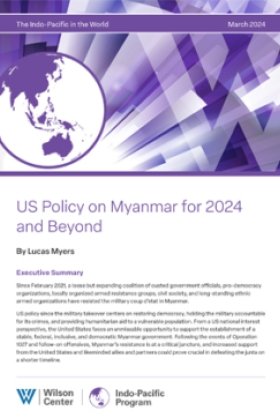Mexico Institute in the News: Mexican Election May Change How War on Drugs is Fought
Whoever is elected President of Mexico is likely to continue the war on drugs with a strategy that may shift to using more civilian police or a focus on preventing youth from joining cartels.
March 9, 2012, Arizona Republic News, 12 News Arizona
Mexico’s U.S.-backed war against violent drug cartels could undergo a tactical shift, depending on which of the candidates vying to replace outgoing President Felipe Caldern wins this summer’s Mexican presidential election...
...Analysts said they expect the next Mexican president to remain committed to the fight, but the strategy may shift from Caldern’s heavy reliance on the Mexican military to greater use of the civilian police force and more emphasis on creating jobs and social programs to keep young Mexicans from joining the cartels...
“There will be variations in approaches among the candidates, but I think they all know that there is no appetite in Mexico for the government to turn its back on the war against organized crime,”
said Eric Olson, a senior associate at the Mexico Institute of the Woodrow Wilson International Center for Scholars.
“I think that’s the reassuring message for the United States.”
Less reliance on the Mexican military doesn’t worry U.S. officials as long as the new Mexican president remains committed to battling the cartels, Olson said.
“All three of the candidates came out and said they were committed to continuing the war, and that’s what Biden wanted,”
Olson said...
About the Author

Eric L. Olson
Director of Policy and Strategic Initiatives, Seattle International Foundation

Mexico Institute
The Mexico Institute seeks to improve understanding, communication, and cooperation between Mexico and the United States by promoting original research, encouraging public discussion, and proposing policy options for enhancing the bilateral relationship. A binational Advisory Board, chaired by Luis Téllez and Earl Anthony Wayne, oversees the work of the Mexico Institute. Read more

Latin America Program
The Wilson Center’s prestigious Latin America Program provides non-partisan expertise to a broad community of decision makers in the United States and Latin America on critical policy issues facing the Hemisphere. The Program provides insightful and actionable research for policymakers, private sector leaders, journalists, and public intellectuals in the United States and Latin America. To bridge the gap between scholarship and policy action, it fosters new inquiry, sponsors high-level public and private meetings among multiple stakeholders, and explores policy options to improve outcomes for citizens throughout the Americas. Drawing on the Wilson Center’s strength as the nation’s key non-partisan policy forum, the Program serves as a trusted source of analysis and a vital point of contact between the worlds of scholarship and action. Read more









